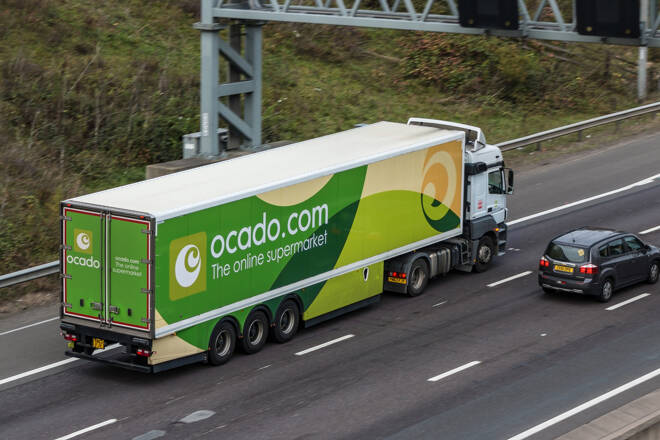Advertisement
Advertisement
Ocado Share Price Slips Despite Solid H1 Results
By:
The online grocery company posted a solid set of first half numbers as group revenue increased by 23.2% to £1.08 billion. Retail revenue rose by 27.2% to £1.02 billion, and fees from its international business jumped by 58% to £73.7 million.
The opening of operations in Paris and Toronto boosted the overseas business. The expansion of the group came at a cost, and that was a contributing factor behind the 36% fall in EBITDA to £19.8 million. The firm is in better shape as it swung from a net debt position of £283.4 million to a cash balance of £196.2 million.
In terms of the guidance, there were no material changes to the previous forecast. The company anticipates a positive outlook for online groceries, but the guidance for retail revenue remains suspended on account of the unpredictable nature of the pandemic. Ocado is planning on capital expenditure of roughly £600 million this year, so it is clearly optimistic about its prospects.
Ocado issued a positive second quarter update in early May. The group said that retail revenue growth was 40.4%, and that was a big improvement on the 10.3% posted in the first quarter. The lockdown acted as a double victory for the firm, as grocery stores across the board experienced a jump in activity as some people decided to stockpile items. The fact the lockdown was driven by health concerns, encouraged some people to go down the route of online shopping. The update in May pushed the Ocado share price higher and it went to a record high in June.
Ocado have not been without there issues, for example, the fire at their operation in Andover was a big factor in the widening of last year’s loss. The full year pre-tax loss was £214.5 million, and that was a big increase on the £44 million loss from the previous year. The fire wasn’t blamed for everything, as the loss at its international solutions unit increased too. The group revenue increased by 9.9% to £1.75 billion as it popularity increased at home and abroad.
The group muddled along for years as it tried to compete with the online division of well-established players such as Tesco. Like any relatively new business, it took its time working on its craft. Ocado tried unsuccessfully to strike up international partnerships for years, but then it relatively quick succession, it brokered deals in France, Canada, the US, Australia and more recently Japan.
It seems to me the more partners Ocado racked up, the easier it was for them to strike up further partnerships. The firm has marked itself out as a specialist in online food delivery, and given the enormous shift to e-commerce in the past few months, Ocado should be in a good position to sign-up more partners.
The Ocado share price is up 60% year-to-date, which has driven up its market capitalisation to more than £15 billion. Keep in the collective market capitalisation of Sainsbury’s, Morrisons and Marks and Spencer is roughly £11 billion. The lofty valuation of Ocado has prompted a few raised eyebrows, so the company has high expectations to live up to.
The stock has been in an uptrend since mid-March and while it holds above its 50-day moving average at 2,001p, the bullish trend should continue.
For a look at all of today’s economic events, check out our economic calendar.
By David Madden (Market Analyst at CMC Markets UK)
About the Author
David Maddencontributor
David started his career in the City of London in 2007 and has since developed a strong understanding of the financial markets.
Advertisement
